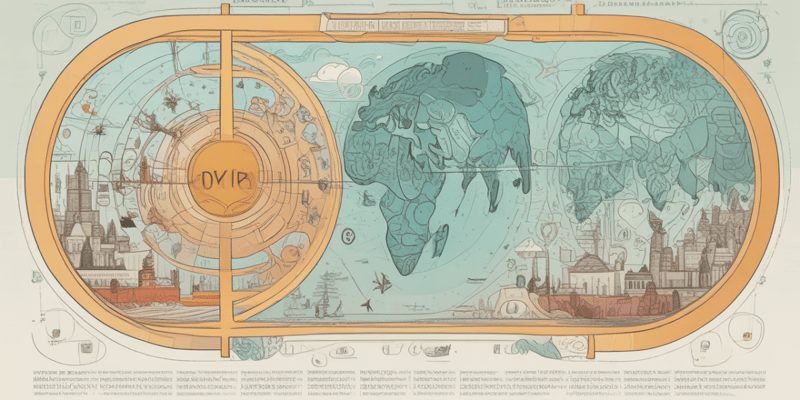Podcast
Questions and Answers
What is the primary purpose of defining the aim and scope of a study?
What is the primary purpose of defining the aim and scope of a study?
Why is it important to work closely with stakeholders when crafting questions?
Why is it important to work closely with stakeholders when crafting questions?
What is the 'aim' of a study?
What is the 'aim' of a study?
What should questions ask about in user research?
What should questions ask about in user research?
Signup and view all the answers
Why is it important to consider the structure and flow of questions?
Why is it important to consider the structure and flow of questions?
Signup and view all the answers
What is the primary purpose of asking 'Why?' in user research interviews?
What is the primary purpose of asking 'Why?' in user research interviews?
Signup and view all the answers
What is the purpose of the 'Wrap up' questions in a user research interview?
What is the purpose of the 'Wrap up' questions in a user research interview?
Signup and view all the answers
Why is it essential to avoid leading questions in user research interviews?
Why is it essential to avoid leading questions in user research interviews?
Signup and view all the answers
What is the difference between open and leading questions?
What is the difference between open and leading questions?
Signup and view all the answers
Why is it essential to practice conducting user research interviews?
Why is it essential to practice conducting user research interviews?
Signup and view all the answers
What is the primary goal of exploring users' current workflows in the research process?
What is the primary goal of exploring users' current workflows in the research process?
Signup and view all the answers
What is the 'Quick and Dirty Usability Test' described in Leah Buley's book used for?
What is the 'Quick and Dirty Usability Test' described in Leah Buley's book used for?
Signup and view all the answers
What is a persona in the context of user research?
What is a persona in the context of user research?
Signup and view all the answers
What is the primary difference between quantitative and qualitative data in user research?
What is the primary difference between quantitative and qualitative data in user research?
Signup and view all the answers
What is the suggested structure for a user research interview session?
What is the suggested structure for a user research interview session?
Signup and view all the answers
What is the main benefit of conducting a practice run with a volunteer?
What is the main benefit of conducting a practice run with a volunteer?
Signup and view all the answers
Why is it important to ask concise questions during the interview?
Why is it important to ask concise questions during the interview?
Signup and view all the answers
What should you do with your 'must have' questions during the interview?
What should you do with your 'must have' questions during the interview?
Signup and view all the answers
Why is it a good idea to pad your interview duration with 5-10 minutes?
Why is it a good idea to pad your interview duration with 5-10 minutes?
Signup and view all the answers
When should you do your practice run?
When should you do your practice run?
Signup and view all the answers
Study Notes
Crafting Great Questions for User Research
- Effective user research involves asking the right questions to uncover users' needs and experiences.
- Questions should be crafted to explore what works and doesn't work in users' current workflows, identify unmet needs, and discover opportunities to improve the overall experience.
Understanding the Aim and Scope of the Study
- Define the aim of the study: what you're trying to find out, and what you want to achieve.
- Define the scope of the study: who you're researching, and how you're doing your analysis.
- The aim and scope of the study help focus the direction of your questions, making it easier to analyze the results.
Structuring Your Questions
- Use an hourglass structure for your interview: start broad, then narrow down to specifics, and finally, broaden out again.
- The opening: ask questions about users' work, how they currently use the product, and general thoughts on how things are currently working for them.
- The middle: ask questions that help drill down on detailed feedback on the feature or concept you're trying to improve.
- The wrap-up: ask big questions about users' overall impressions and capture last-minute thoughts.
Avoiding Bias in Your Questions
- Leading questions can lead to biased results, so it's essential to ask open and non-leading questions.
- Avoid asking questions that solicit emotional responses, as they can be hard to analyze.
- Stay away from leading questions, ask open questions, and ask what users are thinking rather than what they're feeling.
Tips for Conducting Effective Interviews
- Practice makes perfect: conduct dry runs with volunteers to refine your questions and improve your interview skills.
- Ask short, precise questions to get concise answers.
- Ask your important questions early in case you get a verbose user.
- Highlight the "must-have" questions to ensure you ask them.
Building Questions as an Art and Science
- Crafting questions is both an art and a science, requiring consideration of the aim and scope of the study, structure and flow of the questions, and the way the questions are worded.
- Work closely with stakeholders to get their feedback on your questions and improve them until you're ready to interview.
- Use iterations to build stakeholder engagement in your project.
Studying That Suits You
Use AI to generate personalized quizzes and flashcards to suit your learning preferences.
Description
Learn how to craft effective and unbiased questions for user research. Understand how to structure questions that flow well and get the most out of your sessions.




